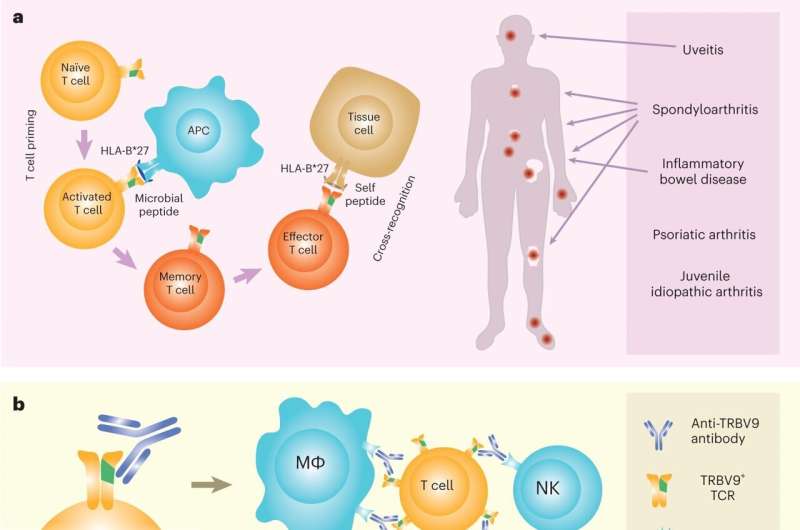This article has been reviewed according to Science X's editorial process and policies. Editors have highlighted the following attributes while ensuring the content's credibility:
fact-checked
peer-reviewed publication
trusted source
proofread
Targeted depletion of TRBV9+ T cells as immunotherapy in a patient with ankylosing spondylitis

Researchers from Skoltech contributed to a large study made by colleagues from Pirogov Russian National Research Medical University, Shemyakin-Ovchinnikov Institute of bioorganic chemistry and other universities and organizations. The article, published in the Nature Medicine journal, presents an innovative treatment for ankylosing spondylitis.
Ankylosing spondylitis—or Bekhterev's disease—is an autoimmune disease affecting limb and spinal joints. Chronic inflammation leads to ankylosis (adhesion of joints and their stiffness), impaired motor functions, and other complications. Autoimmunity includes many diseases, in which the immune system erroneously attacks healthy tissues of the body, taking them as foreign.
In previous work, the research team has shown a relationship between ankylosing spondylitis and specific TRBV9+ T-cell receptors. The new treatment, which directly attacks cells that are the primary cause of the disease, is based on the TRBV9+ T-lymphocytes depletion with a cytotoxic antibody.
Previously, patients could only receive symptomatic treatment, but the disease continued to progress. The new drug affects only a small part of T-lymphocytes and does not have systemic immunosuppressive effects (that is, it does not suppress any type of immune response systematically).
The article focuses on a patient who has been in stable remission for four years, thanks to the treatment. The authors point out that his quality of life has significantly increased compared to the previous period, when he was on immunosuppressive anti-TNF therapy. He is experiencing better mobility and less pain. It is now possible to lead a more active lifestyle. The patient also stopped taking anti-TNF therapy after five years of continuous use.
A contribution to the project was made by Skoltech Ph.D. student Kseniia Lupyr. According to Kseniia, she contributed to the bioinformatic part of the work. "I have been analyzing T-cell repertoires for four years now. When I was doing my master's degree, the first tests on primates were performed. I analyzed the results and confirmed that TRBV9+ T cells were removed, and no other T cells were affected. Later, I analyzed data from the first patient who received the new drug."
"I integrated all available information: lab test results, mobility metrics, sequencing data of T-cell repertoires; analyzed and visualized the results for the new paper. As the patient's T-cell repertoires are available for 15 years, it's possible to trace autoimmune clones over a long period of time. For example, we noticed that the patient's well-being deteriorates with an increase in the proportion of autoimmune clones in the T-cell repertoire."
According to Ksenia, targeted treatment for ankylosing spondylitis was achieved because, among other things, it is associated with human leukocyte antigen (HLA) B27. HLAs code for proteins that act as "showcases" on cell surfaces that show T cells what peptides are inside. Recognizing them, T-lymphocytes get activated and attack the corresponding cells of the body.
"Adaptive immune response varies between people. So different patients may have different autoimmune clones. Since the disease is associated with HLA B27, there is a chance that the drug will help many HLA-B27 positive patients with ankylosing spondylitis," adds Ksenia.
The authors of the paper also note that anti-TRBV9+ therapy may have applications in other HLA-B27-associated diseases, such as psoriatic arthritis, acute anterior uveitis, juvenile idiopathic arthritis, and Crohn's disease.
Clinical trials of the drug against ankylosing spondylitis are currently in the second phase, and the third one has recently been approved. Researchers are waiting for the results to draw conclusions about the drug's effectiveness in a wider sample of patients.
More information: Olga V. Britanova et al, Targeted depletion of TRBV9+ T cells as immunotherapy in a patient with ankylosing spondylitis, Nature Medicine (2023). DOI: 10.1038/s41591-023-02613-z


















